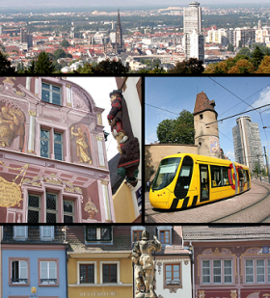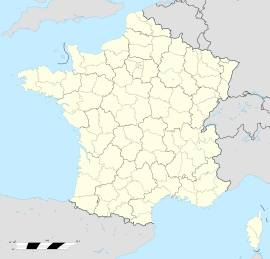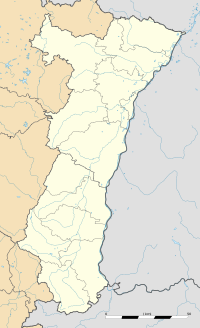- Mulhouse
-
"Mülhausen" redirects here and should not be confused with Mühlhausen.
Mulhouse
Mulhouse / Milhüsa


Flag of Mulhouse Coat of arms of Mulhouse Administration Country France Region Alsace Department Haut-Rhin Arrondissement Mulhouse Intercommunality Mulhouse Alsace Agglomération Mayor Jean Rottner (UMP)
(2010–2014)Statistics Elevation 232–338 m (761–1,109 ft)
(avg. 240 m/790 ft)Land area1 22.18 km2 (8.56 sq mi) Population2 110,514 (2006) - Density 4,983 /km2 (12,910 /sq mi) INSEE/Postal code 68224/ 68100, 68200 Dialling code 0389, 0369 1 French Land Register data, which excludes lakes, ponds, glaciers > 1 km² (0.386 sq mi or 247 acres) and river estuaries. 2 Population without double counting: residents of multiple communes (e.g., students and military personnel) only counted once. Coordinates: 47°44′58″N 7°20′24″E / 47.749481°N 7.33994°E
Mulhouse (French: Mulhouse, pronounced: [myluz]; Alsatian: Milhüsa or Milhüse, [mɪlˈyːzə]; German: Mülhausen; i.e. mill hamlet) is a city and commune in eastern France, close to the Swiss and German borders. With a population of 110,514[1] and 278,206 inhabitants in the metropolitan area[2] in 2006, it is the largest city in the Haut-Rhin département, and the second largest in the Alsace region after Strasbourg. Mulhouse is the principal commune of the 32 making up the Communauté d'agglomération Mulhouse Alsace Agglomération (MAA, population 252,000).[3]
Mulhouse is famous for its museums, especially the Cité de l’Automobile (also known as "Musée national de l’automobile") and the Musée Français du Chemin de Fer (also known as "Cité du train"), respectively the largest automobile and railway museums in France. An industrial town nicknamed "the French Manchester",[4] Mulhouse is also the main seat of the Upper Alsace University, where the secretariat of the European Physical Society can be found.
Contents
Administration
Mulhouse is the chief city of an arrondissement of the Haut-Rhin département, of which it is a sub-prefecture.
History
Legends mention the origin of the town in 58 BC, but the first written records of Mulhouse date from the twelfth century. It was part of the southern Alsatian county of Sundgau in the Holy Roman Empire. From 1354–1515 Mulhouse was part of the Décapole, an association of ten Free Imperial Cities in Alsace. The city joined the Swiss Confederation as an associate in 1515 and was therefore not annexed by France in the Peace of Westphalia in 1648 like the rest of the Sundgau. An enclave in Alsace, it was a free and independent republic associated with the Swiss Confederation until, after a vote by its citizens on 4 January 1798, it became a part of France in the Treaty of Mulhouse signed on 28 January 1798, during the Directory period of the French Revolution.
After the Prussian victory in the Franco-Prussian War and the Otto von Bismarck engineered unification of Germany under Prussian King William I as the new German Kaiser, Mulhouse was annexed to the German Empire as part of the territory of Alsace-Lorraine (1870–1918). The city was briefly occupied by French troops on 8 August 1914 at the start of World War I, but they were forced to withdraw two days later in the Battle of Mulhouse. Alsace-Lorraine was invaded and reacquired by France after World War I. Although never formally annexed by Germany after the Battle of France in 1940, it was occupied by German forces until returned to French control at the end of the war in 1945.
The town's development was stimulated first by the expansion of the textile industry and tanning, and subsequently by chemical and engineering industries from the mid 18th century. Mulhouse was for a long time called the French Manchester. In consequence, the town has enduring links with Louisiana, from which it imported cotton, and also with the Levant. The town's history also explains why its centre is relatively small.
Geography
Two rivers run through Mulhouse, the Doller and the Ill, both tributaries of the Rhine.
Districts
Medieval Mulhouse consists essentially of a lower and an upper town.
- The lower town was formerly the inner city district of merchants and craftsmen. It developed around the Place de la Réunion (which commemorates its reunion with France). Nowadays this area is pedestrianised.
- The upper town developed from the eighteenth century on. Previously, several monastic orders were established there, notably the Franciscans, Augustinians, Poor Clares and Knights of Malta.
- The Nouveau Quartier (New District) is the best example of urban planning in Mulhouse, and was developed from 1826 on, after the town walls had been torn down (as they were in many towns in France). It is focused around the Place de la République. Its network of streets and its triangular shape are a good demonstration of the town's desire for a planned layout. The planning was undertaken by the architects G. Stolz and Félix Fries. This inner city district was occupied by rich families and the owners of local industries, who tended to be liberal and republican in their opinions.
- The Rebberg district consists of grand houses inspired by the colonnaded residences of Louisiana cotton planters. Originally, this was the town's vineyard (the word Rebe meaning vine in German). The houses here were built as terraces in the English style, a result of the town's close relationship with Manchester, where the sons of industrialists were often sent to study.
Principal places of interest
- Hôtel de Ville (sixteenth century). The town hall was built in 1553 in the Rhenish Renaissance style. Montaigne described it as a "palais magnifique et tout doré" ("a splendid golden palace") in 1580. It is known for its trompe l'œil paintings, and its pictures of allegories representing the vices and virtues.
- Workers' quarter (mid 19th century), inspired workers' quarters in many other industrial towns.[5]
- Place de la Bourse and the building of the Société Industrielle de Mulhouse, in the Nouveau Quartier (19th century)
- Cité de l’Automobile (featuring the Schlumpf collection)
- French National Railway Museum
- Museum of Electricity (Electropolis)
- Museum of Printed Textiles (Musée de l'impression sur étoffes)
- The Parc Zoologique et Botanique de Mulhouse (botanical garden and zoo)
- Saint-Steffen Calvinist temple (1859–1869), by Jean-Baptiste Schacre
-
Hôtel de Ville (Rothüs), Mulhouse
Principal economic activities
 Campus "La Fonderie" of the Upper Alsace University
Campus "La Fonderie" of the Upper Alsace University
As early as the mid-19th century, Mulhouse was known as "the industrial capital of Alsace", the "city with a hundred chimneys" (cité aux cent cheminées) and "the French Manchester"[5]
- Automobile industry (Peugeot's Mulhouse factory is the largest employer in Alsace)
- Chemical industry (ICMD)
- Electronics (Clemessy)
- Engineering (SACM – Wärsitlä)
Transport
Mulhouse is served by Basel-Mulhouse-Freiburg International Airport.
Mulhouse has its own SNCF station, Gare de Mulhouse, with a direct connection to Basel in Switzerland and several other regional and national destinations, including Paris, Strasbourg, Lyon and Besançon.
Transport within Mulhouse is provided by Soléa and comprises a network of buses together with the city's tram network, which opened on 13 May 2006 and was due to be further extended by 2008.
Miscellaneous
Notable people
Mulhouse was the birth place of:
- Jean de Beaugrand (1584–1640), lineographer and mathematician
- Johann Heinrich Lambert (1728–1777), mathematician, physicist and astronomer
- Napoléon Henri Reber (1807–1880), composer
- Charles Frédéric Girard (1822–1895), biologist specializing on ichthyology and herpetology
- Franz Eugen Schlachter (1859–1911), revivalist preacher, classical scholar and translator of the Schlachter Bible.
- Alfred Dreyfus (1859–1935), French military officer best known for being the focus of the Dreyfus affair
- Georges Friedel (1865–1933), mineralogist, son of Charles Friedel
- Pierre Weiss (1865–1940), physicist
- Alfred Werner (1866–1919), Nobel Prize in Chemistry 1913
- Artur Dinter (1876–1948), writer and Nazi politician.
- Friedrich Wilhelm Levi (1888–1966), mathematician
- Robert Wyler (1902–1971), film producer
- William Wyler (1902–1981), award-winning motion picture director
- Karl Brandt (1904–1948), personal physician to Adolf Hitler and head administrator of the T-4 Euthanasia Program
- Jean Schlumberger (1907–1987) Jewelry designer at the Tiffany & Co
- Pierre Probst (1913–2007), comic and children book artist
- Katia and Maurice Krafft, volcanologists
- Christiane Scrivener (born 1925), EU-Commissioner
- Frank Ténot (1925–2004), press agent, pataphysician and jazz critic
- Huguette Dreyfus (born 1928) harpsichordist
- Pierre Chambon (born 1931), biologist
- François Florent (born François Eichholtzer, 1937), actor, founder of the Cours Florent
- Jean Brenner (1937–2009), painter
- Daniel Roth (born 1942), organist, composer and pedagogue
- Mireille Delunsch (born 1962), soprano
- Paul Meyer (born 1965), clarinetist
- Thierry Omeyer (born 1976), handball goalkeeper
- Marc Pfertzel (born 1981), football player
- Antar Yahia (born 1982), football player
- Vitaa (born 1983), singer
- Véronique North-Minca, diplomat
- other notable residents:
- Alfred de Glehn designer of steam locomotives
Mayors of Mulhouse
- Jean-Marie Bockel (since 1989)
- Joseph Klifa (1981–1989)
- Emile Muller (1956–1981)
International relations
Twin towns – Sister cities
Mulhouse is twinned with:
 Walsall, England, since 1953
Walsall, England, since 1953 Antwerp, Belgium, since 1956
Antwerp, Belgium, since 1956 Kassel, Germany, since 1965
Kassel, Germany, since 1965 Bergamo, Italy, since 1989
Bergamo, Italy, since 1989 Milwaukee, Wisconsin, United States of America
Milwaukee, Wisconsin, United States of America Chemnitz, Germany, since 1990
Chemnitz, Germany, since 1990 Giv'atayim, Israel, since 1991
Giv'atayim, Israel, since 1991 Timişoara, Romania, since 1991 (Coopération décentralisée)
Timişoara, Romania, since 1991 (Coopération décentralisée) Arkhangelsk, Russia, since 1992
Arkhangelsk, Russia, since 1992 El Khroub, Algeria, since 1999 (Coopération décentralisée)
El Khroub, Algeria, since 1999 (Coopération décentralisée) Sofara, Mali, since 2003 (Coopération décentralisée)
Sofara, Mali, since 2003 (Coopération décentralisée)
See also
- Communes of the Haut-Rhin département
References
- ^ Commune : Mulhouse (68224) on INSEE
- ^ Aire urbaine 1999 : Mulhouse (031) on INSEE
- ^ Mulhouse Alsace Agglomération / Conseil installé hier soir , Les Dernières Nouvelles d'Alsace, 5 January 2010 (French)
- ^ Le sex appeal industriel de Mulhouse (French)
- ^ a b Scheurer, Marie-Philippe; Lehni, Roger; Menninger, Claude: Mulhouse, Haut-Rhin − Images du Patrimoine, Le Verger, Illkirch-Graffenstaden, 1990, ISBN 2-908367-18-1 (French)
External links
- Official website (English) (French) (German)
- Official website of the Tourist Office of Mulhouse and its region – in English
- Official website of the Convention Bureau of Mulhouse and its region – in English
- The Mulhousian Ferret: High Resolution Video Guide of Mulhouse (French)
- MulhouseBienvenue.com City Guide Town of Mulhouse (French)
- Museum of Printed Textiles
- TramTrain website (English) (German)
Categories:- Mulhouse
- Communes of Haut-Rhin
- Subprefectures in France
- Cities in France
- Former associates of Switzerland
- Imperial free cities
Wikimedia Foundation. 2010.








